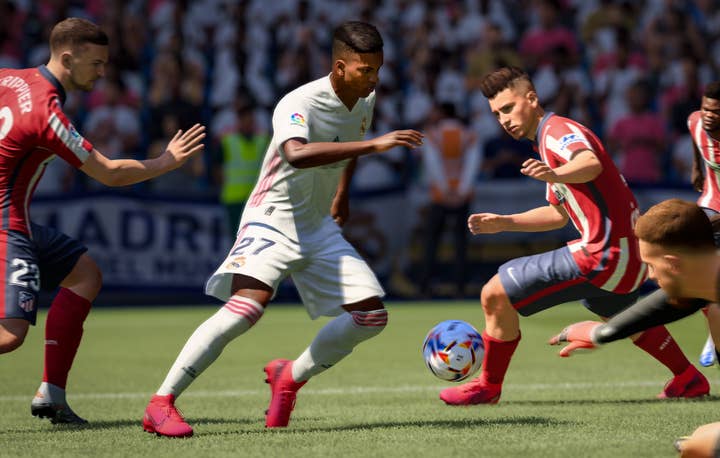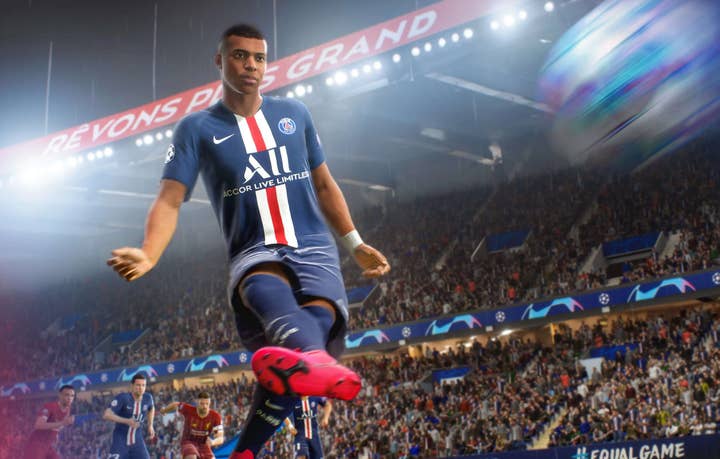FIFA 21 | Critical Consensus
The new FIFA has the lowest Metacritic average in the series' history -- but does a game with a license to print money have any reason to evolve?
In 2011, I was part of a press tour of prominent Canadian studios, which included an afternoon at EA Vancouver and the opportunity to talk shop with David Rutter -- then the executive producer of FIFA, now the head of every EA studio in Europe.
I had been playing and reviewing FIFA for several years, and I asked Rutter a question that burned every time I was tasked with appraising the differences between each new edition: annualised games demand change with each iteration, but can you reach a level of quality where change can only harm the overall experience? Rutter politely dismissed the idea, assuring me that the fascinating world of football was more than capable of providing EA with the inspiration needed to justify a $60 product every year.
The apparent dwindling of goodwill among both critics and players should be of great concern to any publisher
That was a few months before the launch of FIFA 12, two years before Ultimate Team made its debut and changed the face of the entire franchise. FIFA was popular in 2011, but the small group of journalists in that boardroom in EA Vancouver had no idea just how big it would become. With a cursory application of hindsight, it would seem that Rutter's belief was correct.
Look closer, however, and the series' astounding revenue and sales numbers don't tell the whole story. Usually, this article focuses on the reviews of a single product, but the Metacritic average for FIFA 21 -- 73 on PlayStation 4, the platform with by far the most available reviews -- was low enough to send the memory of that meeting with Rutter crashing to the front of my mind. That score demands a broader perspective on what has happened to the critical view of EA's most important IP.
The graph below shows two sets of data over time: the Metacritic average of every FIFA game since FIFA 10, on the platform with the most available reviews; and the Metacritic user reviews for the same version of that game over the same period.
The picture is one of decline. The series' user reviews have been in freefall since FIFA 17, landing at just 0.9 out of 10 at the time of writing for FIFA 21. The decline in critic reviews is much less pronounced, but no less significant: players tend to offer emotive opinions, leading to greater disparities in ratings; the press, however, takes a more balanced view, and games with the scope and overall polish of FIFA almost never get a score below six out of ten. If that blue line were plotted on a graph where the vertical axis started at five -- a more useful range for assessing the changing quality of AAA games -- it would be plunging almost as precipitously.
Indeed, FIFA 21 has the lowest critical average of any game in the franchise since Metacritic started keeping track with FIFA 06. The days of the series consistently rating around 90 -- as it did from FIFA 10 to FIFA 13 -- have long since passed, and this apparent dwindling of goodwill among both critics and players should be of great concern to any publisher. This year's game will no doubt be a huge commercial success, and yet perception of the IP appears to have reached an historic low.
"EA [appears] to have hit a sweet spot with the pace of gameplay this year, with matches flowing smoothly"
Simon Cardy, IGN
With FIFA 21, critics agree that the game's Career Mode has received the most significant changes. In his 8 out of 10 review for Video Games Chronicle (VGC), Chris Scullion described it as "a much-needed refresh" -- if not the "complete overhaul" that many fans of the series want to see.
"When playing in manager mode you can now choose a new Simulation option, where you're shown an overview of the pitch -- much like the older Football Manager games -- and things run faster than normal as you make tactical changes on the fly," Scullion said.
"If you're not happy with the way the team is playing, you can jump in at any point and take over. Alternatively, if you're happy enough that you've made a good start in the match, you can choose to just skip to the end and instantly simulate the rest of it. This won't be for everyone, but it certainly helps you get through seasons a lot quicker than before and helps you avoid the less important matches where you have to slog it out against bottom-of-the-league teams on a rainy night."
Most reviews also noted improvements over FIFA 20 in the on-pitch experience. In a 7.4 out of 10 review for IGN, Simon Cardy said that those differences are difficult to spot at first, but the cumulative impact of the myriad "smaller tweaks" eventually become apparent.
"EA [appears] to have hit a sweet spot with the pace of gameplay this year, with matches flowing smoothly and, crucially, the speed of the players feeling appropriate when compared to their real-life counterparts," Cardy said. "Not every attacker can leave a bedraggled defender in their wake this year, but certain stars such as Kylian Mbappe can - which is just as it should be. Inconsistent pacing has been one of my major criticisms of FIFA over the past couple of years, so it's a very welcome sight to see this evened out this year."

Cardy also praised the game's crossing mechanics, which display "nothing but improvement" over FIFA 20. However, as is often the case with FIFA, positive differences are counterbalanced by negative trends in other areas. Cardy noted a marked decline in the quality of goalkeeping, for example, and "almost too simple" passing that, when combined with better positional AI, means creating chances "[needs] little skill or vision to pull off."
Virtually every review of FIFA 21 we looked at featured an extended section describing these small changes -- sometimes for the better, sometimes for the worse, but always reminiscent of reading patch notes. This idea was picked up by The Daily Telegraph's Dan Silver in his three-star review, which suggested that FIFA 21 offers only slightly more than "a mere seasonal update."
"There's no new headline addition, nothing radical to get you out of your seat," Silver said. "Instead its incremental additions: a tweaked dribbling mechanic here; a refined collision model there; and a shuffle back towards slower, more thoughtful passing play which on previous form will probably be patched back into the middle ground by the time the third round of the Cup starts."
"There's no new headline addition, nothing radical to get you out of your seat"
Dan Silver, Daily Telegraph
Both VGC and IGN offered some of FIFA 21's more positive reviews from major outlets, and both made the same observation about the absence of significant new additions. Indeed, EA's process appears to be to add a major new mode only every few years: FIFA Ultimate Team made its debut in FIFA 14, the narrative-driven The Journey was added in FIFA 17, and last year that was replaced with the FIFA Street-esque Volta.
In her 3.5 star review, USGamer's Kat Bailey pointed to Volta as the area with the most changes following Career Mode. However, while those changes "[make] it far more viable than it was in FIFA 20," it's a feature that the community didn't appear to be excited for in the first place. According to Bailey, Volta in FIFA 21 "still feels like a bit of non-starter."
"Open up Twitch now, and you won't see anyone streaming Volta -- it's all FUT," Bailey said, noting that the game was still in its (admittedly very popular) early access phase. "I'm sure EA would counter that Volta is intended for new players who want to get comfortable with the gameplay, but I'm not even sure Volta works on that level, just because it's fairly complex in itself. If you're not comfortable with FIFA's controls, you will get absolutely ripped apart.
"Is it too early to call Volta a failed experiment? Maybe. Online team play is a much-needed improvement for Volta, and its faster, flair-focused brand of street football is a decent change of pace from the core gameplay. EA is doing its part to make Volta viable, but if it doesn't find its feet this year, I doubt it ever will."

This is, perhaps, one of the reasons for the slow, steady decline in user and critic reviews. With annual changes to the on-pitch experience often feeling like a shuffle of the deck -- some new improvements, some new problems, any of which might change again in future iterations -- a great deal rests on those sporadic, big-ticket additions striking a chord with the audience. With both The Journey and Volta, that appeal was perhaps too niche to avoid a gathering sense of stasis in a franchise that still asks for a $60 purchase every single year despite feeling (for the most part, anyway) like a live-service game.
For USGamer's Bailey, some of the responsibility for that can be laid at the door of Ultimate Team, a mode that has become "inescapable, completely subsuming FIFA's culture" since its introduction seven years ago. It has been a financial boon for EA, of course, and Bailey made no attempt to deny its obvious appeal -- but its impact on the meaningful evolution of FIFA as a franchise is more ambiguous.
"FUT's giant profits have made sports games viable amid rising development costs, but at the cost of making EA complacent"
Kat Bailey, USGamer
"I think the mode has subverted the sports landscape over the past generation, encouraging EA to throw its resources into microtransactions rather than legacy features like career mode," Bailey argued. "FUT's giant profits have made sports games viable amid rising development costs, but at the cost of making EA complacent."
Eurogamer's Wesley Yin-Poole expressed similar reservations about the impact of FIFA Ultimate Team, specifically in the normalisation of microtransactions that have been widely compared to gambling for an audience with millions of young players. Yin-Poole had much the same, cautiously positive assessment of FIFA 21 as other critics -- "a fun, over-the-top football game... but there is no big new feature" -- and commended tweaks to FUT that add customisation and make it more accessible to time-poor players.
On the subject of "the pay-to-win -- and ethically dubious -- loot boxes," however, Yin-Poole had no kind words to offer.
"Did EA not get the battle pass memo or something? Did Fortnite pass the studio by? FIFA 21 has season progress, which looks like it wants to be a battle pass, but it feels like EA pulled out of the tackle because it was frightened of getting injured. Get rid of pay-to-win loot boxes and sell a premium battle pass. Sell meaningless items. Sell celebrations. Sell kits. Sell player haircuts, for all I care. EA Sports' famous tagline is "it's in the game". Well, it's time to take pay-to-win out -- and put a proper battle pass in."
Publicly traded companies thrive on predictable revenue, and there are few more predictable forms of revenue in the games industry than Ultimate Team in its current form. As such, EA -- which has investors that clearly love FUT's ability to return vast amounts of revenue -- has few incentives to swap loot boxes for a battle pass beyond the moral, the ethical, and a possible government intervention at some point in the future.
Is the sense of discomfort around loot boxes also contributing to the downward trend in reviews? Possibly. At the end of 2020, it will be simple to point at dollars earned and copies sold and deduce that FIFA is stronger than it has ever been, but there is clear evidence that the franchise is in need of reinvention. FIFA had years without major new features before. FIFA has been released around a console transition before. FIFA has monetised through "surprise mechanics" since the start of this generation -- and yet that combination of persistent flaws has never received such a cool response from critics and users.
The question now is: with all that Ultimate Team revenue flooding in, will EA even notice?

